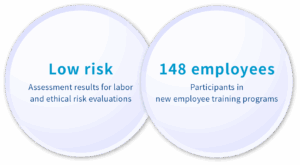
MPI fulfills its corporate social responsibility by valuing and safeguarding employee human rights through effective management and supervision. In accordance with the Corporate Social Responsibility Best Practice Principles and by following international standards, including the United Nations Guiding Principles on Business and Human Rights (UNGPs), the International Covenant on Economic, Social and Cultural Rights (ICESCR), the International Covenant on Civil and Political Rights (ICCPR), the Convention on the Elimination of All Forms of Discrimination Against Women (CEDAW), and the Responsible Business Alliance (RBA) Code of Conduct, MPI is committed to upholding gender equality in the workplace, protecting the right to work, and prohibiting all forms of discrimination. MPI also pledges to foster a diverse, equitable, and inclusive (DEI) workplace environment. To uphold these commitments, MPI has established comprehensive internal regulations, including the “Human Resources Management Procedures”, “Regulations for Gender Equality in Employment”, “Regulations for Measures of Prevention, Correction, Complaint, and Punishment of Workplace Sexual Harassment”, and “Code of Employee Ethics and Conduct” to protect employee human rights. Violation of employee human rights will be disciplined in accordance with the “Regulations for Employee Rewards and Disciplines”. Furthermore, MPI continuously works to enhance the awareness of employee human rights. All employees are required to regularly participate in corporate social responsibility training sessions and workplace sexual harassment prevention programs to ensure the protection of human rights within the workplace.
| Human Rights Core Items | Implementation Approach | Management Measures |
|---|---|---|
| No forced labor |
|
|
| No child labor and protection for young employees |
|
|
| Humane Treatment |
|
|
| Working Hour Benefits |
| |
| Freedom of Association |
|
2024 Implementation Results


